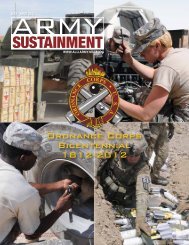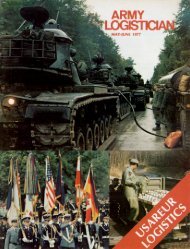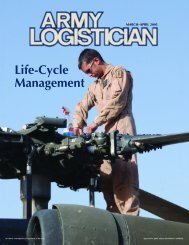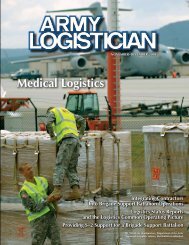Do Stryker Brigade Combat Teams Need Forward Support ...
Do Stryker Brigade Combat Teams Need Forward Support ...
Do Stryker Brigade Combat Teams Need Forward Support ...
Create successful ePaper yourself
Turn your PDF publications into a flip-book with our unique Google optimized e-Paper software.
Wartime Host Nation <strong>Support</strong><br />
on the Korean Peninsula<br />
by Lieutenant co L o n e L KaM S. Gunther<br />
The reception, staging, and onward movement of<br />
U.S. forces arriving in Korea during a contingency<br />
are not possible without extensive logistics<br />
support from the host nation. To meet this need, the<br />
United States has developed and routinely tests an<br />
extensive wartime host nation support (WHNS) program<br />
with the Republic of Korea.<br />
WHNS Mission<br />
Under the WHNS program, the Republic of Korea<br />
provides military and civilian resources and assistance<br />
for the reception, staging, onward movement,<br />
integration, and sustainment of U.S. forces in times<br />
of crisis, hostilities, or war, as set forth in agreements<br />
between the governments of both nations. The mission<br />
of the Korean-U.S. WHNS plan is to allow the rapid<br />
deployment of U.S. combat forces to the Korean Peninsula<br />
during a crisis, using Republic of Korea-provided<br />
logistics assets that may be reinforced by U.S. logistics<br />
units and equipment later in the fight.<br />
The WHNS program is coordinated by the Republic<br />
of Korea Ministry of National Defense (MND) and the<br />
WHNS branch of the U.S. Forces Korea (USFK) Assistant<br />
Chief of Staff, J–4. The MND and USFK J–4 serve<br />
as conduits between both governments for all WHNS<br />
matters. During times of peace, they develop plans and<br />
memorandums of agreement for using WHNS assets<br />
during hostilities. During war, they execute those<br />
plans, prepare to receive the approved WHNS assets,<br />
and acquire unforeseen host nation support for subordinate<br />
units with assistance from functional area proponents<br />
on the USFK and component staffs. The WHNS<br />
has an “unforeseen support” process that is available<br />
to expeditiously satisfy any new requirement (or<br />
8<br />
requirements previously submitted but not yet<br />
approved) by the Republic of Korea MND.<br />
Implementation of the WHNS Program<br />
The capstone document of the WHNS program is the<br />
Umbrella Agreement, which was signed in 1991 by the<br />
U.S. Secretary of Defense and the Republic of Korea<br />
Minister of National Defense. The WHNS program<br />
was formally established in 1992 when the Republic<br />
of Korea National Assembly ratified the agreement.<br />
U.S. forces submitted their first requirements to the<br />
Republic of Korea MND in 1994. The first Republic<br />
of Korea Provisional <strong>Support</strong> Plan was published in<br />
1995; this plan continues to be updated biennially for<br />
implementation in January of odd years.<br />
Under the Umbrella Agreement, the Republic of<br />
Korea agrees that, during conflicts, it will provide<br />
resources that fall into 12 categories: ammunition<br />
services; communication services (domestic and international<br />
circuits); engineering equipment and services;<br />
field services; maintenance equipment and services;<br />
medical supplies and hospitals; nuclear, biological, and<br />
chemical equipment; personnel; petroleum; security;<br />
subsistence; and transportation. The procedures for<br />
acquiring host nation resources depend on the particular<br />
functional area.<br />
A WHNS requirement must meet specific criteria in<br />
order to qualify as a valid WHNS request. By agreement,<br />
WHNS assets are authorized only for the support<br />
of U.S. forces. This means that noncombatant evacuation<br />
operations (NEO) and nongovernmental requests<br />
will not go through the WHNS process. NEO and nongovernmental<br />
requests must go through the Ministry<br />
of Foreign Affairs and Trade, but WHNS requests go<br />
through the MND.<br />
WHNS assets are available only after a declaration<br />
of mobilization and approval by the Republic of Korea<br />
Government. Occasionally, units will receive assets<br />
or services that are not what they asked for. When<br />
requesting WHNS assets, units must identify their<br />
requirements carefully and be very specific. Requested<br />
assets or services must fall into 1 of the 12 functional<br />
area categories mentioned above.<br />
A U.S. using unit checks the performance of a<br />
crane’s boom and cable during a field transfer<br />
exercise in Pyeongtaek.<br />
JULY–AUGUST 2008







